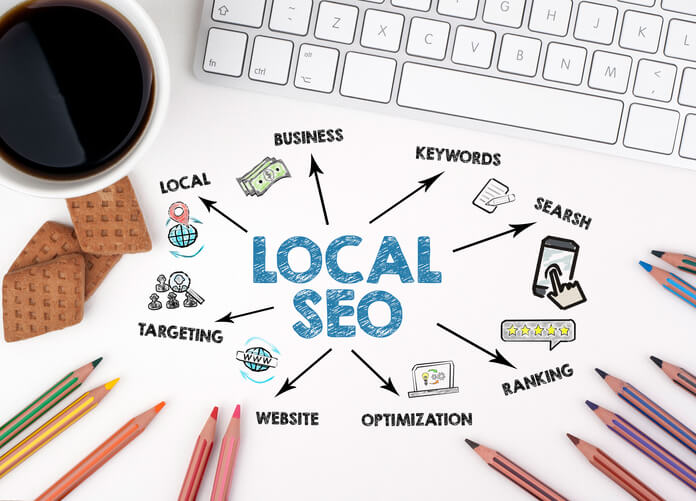Understanding local SEO is crucial for digital marketing students aiming to help small businesses attract local customers and increase in-store visits. A Google study found that 76% of local mobile searches lead to a business visit within a day, with 28% resulting in a purchase.
This blog post will explore effective local SEO strategies to enhance visibility and discuss key ranking factors that drive success.
What is Local SEO and Why is it Important for Small Businesses?
As a digital marketing student, it’s important to grasp that Local SEO (Search Engine Optimization) involves optimizing a business’s online presence to increase visibility in local search results. When someone searches for a service or product near them, local SEO helps ensure that your business appears prominently in the search results. For instance, if someone searches for a “coffee shop near me,” local SEO strategies can help your business appear in the results list.
Local SEO is essential for small businesses because it targets potential customers within a specific geographic area. This focus allows businesses to connect with local customers more likely to convert into actual sales. For business owners, local SEO is one of the most effective digital marketing strategies for driving foot traffic to physical locations and attracting local clientele.

Strategies to Improve Local Search Visibility
What strategies can small businesses employ to improve their local search visibility? To effectively assist small businesses, you can apply local search visibility strategies like optimizing their Google My Business profile, using location-specific keywords in content, building consistent local citations, and encouraging customer reviews.
Optimize Your Google My Business Profile
Local SEO tools are stark, everyday reminders of the impact of AI on digital marketing. One of the most powerful local SEO tools is Google My Business (GMB). A well-optimized GMB profile can significantly improve your visibility in local search results.
Build Local Citations
As a future digital marketing professional, you’ll need to understand that local citations are online mentions of a business’s name, address, and phone number (NAP) on other websites, directories, and social platforms. Consistent and accurate citations across the web can improve your local SEO ranking factors. Ensure that your NAP information is consistent on platforms like Yelp, Yellow Pages, and local business directories.
Create Location-Specific Content
Develop content that resonates with your local audience by focusing on location-specific topics. This can include blog posts about local events, news, or stories that relate to your business. By showcasing your involvement in the community and providing valuable local information, you can increase your relevance in local search results.

Leverage Online Reviews
Online reviews play a significant role in local SEO. Positive reviews enhance your business’s credibility and encourage potential customers to choose your services. Encourage satisfied customers to leave reviews on platforms like Google, Yelp, and Facebook. Respond to both positive and negative reviews professionally and promptly to show that you value customer feedback.
Key Ranking Factors for Local SEO in Small Businesses
Key ranking factors in local SEO for small businesses include proximity, relevance, and prominence. For digital marketing students, understanding the key ranking factors in local SEO is crucial for effectively helping small businesses achieve optimal results. Let’s explore them:
Proximity: The proximity of your business to the searcher’s location is a critical factor. Businesses closer to the searcher are more likely to appear in local search results. While you can’t change your business’s location, optimizing other factors can help improve your visibility.
Relevance: Relevance refers to how well your business matches the search query. Using relevant keywords and categories in your online profiles and content can improve your business’s relevance to local searches.
Prominence: Prominence relates to how well-known and established your business is online. This includes factors such as the number of online reviews, the quality of those reviews, and your business’s overall online presence. A well-optimized GMB profile, high-quality backlinks, and positive reviews can all contribute to your business’s prominence.
Are you looking for a comprehensive digital marketing program?
Contact Cumberland College for more information.
Frequently Asked Questions
What is local SEO and why is it important for small businesses?
As a digital marketing student, it’s important to grasp that Local SEO (Search Engine Optimization) involves optimizing a business’s online presence to increase visibility in local search results. When someone searches for a service or product near them, local SEO helps ensure that your business appears prominently in the search results.
What strategies can small businesses employ to improve their local search visibility?
To effectively assist small businesses, you can apply local search visibility strategies like optimizing their Google My Business profile, using location-specific keywords in content, building consistent local citations, and encouraging customer reviews.
What are the key ranking factors in local SEO?
Key ranking factors in local SEO for small businesses include proximity, relevance, and prominence.




